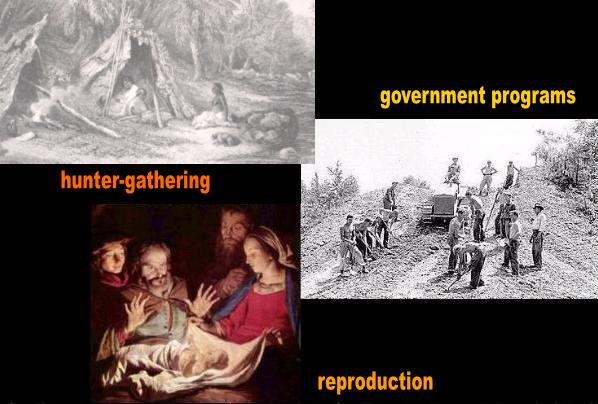| Adapted for the Internet from: Why God Doesn't Exist |
Summary
Assuming the economist concedes that the artificial economy will suffer a crash, he argues finally that it will not necessarily
lead to the extinction of the human race. First, there are things the government can do. We need only look at the 1930s to see
how the State got the country working again with gargantuan state-run programs. Perhaps the government just needs to
increase immigration or offer women economic incentives to have children again. But even if the government cannot get us
out of the jam, Man is a very resourceful species. The 'fittest' will survive and restart the thing over again. It's just back
to Adam and Eve.
I have finally come around to accepting that mainstream businessmen and economists are feeble-minded when it comes to
ecology. They have been conditioned so much to market mechanisms in school and in the ‘real’ world out there that they
can’t relate to what I am saying. I know this because I’ve had long and arduous chats with some individuals from the
establishment. They counter with the most ridiculous solutions, stuff that would make Buster Keaton laugh. I can’t really
take them seriously. It’s like talking to babies. Some have suggested to me that the government can put people back to work
through Keynesian mechanisms like Roosevelt and Hitler did in the 30s. Others tell me that women will produce like rabbits
again after a collapse or that we won’t even meet the bleak scenario I describe in the first place. Yet others say that Man will
resort to bartering and start the whole process all over like we did when civilization was in its infancy. And still others tell me
that they’ll plant tomatoes in their flowerpots. You won’t believe the stupid replies I have collected. I will address a few of these
rejoinders merely to expose just how ignorant businessmen and economists really are about their own subject of expertise.
Here I take pains to debunk the typical loopholes to extinction that the economists come up with.
| Rejoinders: the experts voice their objections to the theory |
- ________________________________________________________________________________________
- Last modified 03/01/08
- Copyright © by Nila Gaede 2008
Module main page: We are the last generation of humans on Earth!
This page: Rejoinders: the experts voice their objections to the theory
Pages in this module:
- 1. Government relief?
2. Brisk business bartering beanies?
3. Return to subsistence farming?
4. Create armies?
5. Duncan: Let's have a kid, Eve!
- 6. Epilogue
7. Corollary. PETA: How to kill, torture, and sterilize unwanted animals humanely

